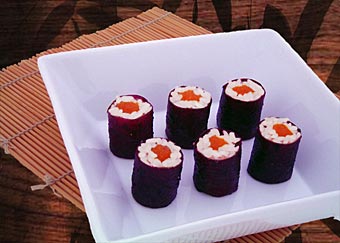Second place is sweet for food development team
Thanks to the innovation of the University of Wisconsin–Madison’s Food Science Club, consumers may one day follow a course of sushi not with sake, but with espresso or a latte.

Kudamushi Fruit Sushi, a dessert designed by students in the Food Science Club, earned second place this weekend (July 28-29) in the annual Institute of Food Technologists product development competition in Chicago.
That’s because the sushi developed by students isn’t made of fish, but of fruit. The dessert item, named Kudamushi Fruit Sushi, earned second place last weekend (July 28-29) in the annual Institute of Food Technologists (IFT) product development competition in Chicago.
The bite-sized treats are designed to look like maki rolls, the iconic edibles of the sushi bar. At the center of each roll, where fish and vegetables usually go, lies a piece of pectin candy that tastes of ginger and peaches. The gummy candy is surrounded by real sushi rice flavored with jasmine. But in the place of seaweed, which wraps a traditional maki roll, the candy-and-rice mix is enveloped in dark purple fruit leather.
"Between the ginger, peaches, fruit leather and jasmine, there are a lot of levels of flavor in this dessert snack," says Jen Baeten, a senior majoring in food science who led the 10-person team that developed the product. "It would make a great party snack."
Baeten adds that Kudamushi Fruit Sushi rolls are fat-free, cholesterol-free and contain a mere 56 calories per three-roll serving. They are packaged frozen, needing only to be thawed before eating.
Dozens of university food-product development teams from across the nation vie each year in the IFT competition. The UW team’s sushi was one of six products named as finalists in May, which were then subjected to an extensive, two-day evaluation during the IFT’s annual meeting in Chicago. A panel of professionals in the food product industry judged each product’s taste, as well student presentations on marketing, cost analysis, packaging and nutrition labeling. Students also completed a rigorous food safety plan required by the federal government for large-scale production of food products.
UW-Madison’s Food Science Club has won the IFT competition three times, in 2001, 2003 and 2005. Only a chicken noodle bite from Michigan State University, which won top honors this year, broke the UW’s streak of odd-year victories.
But Baeten says the team is proud of its showing, not only because it fared well in the national competition, but because students had the opportunity to make many professional contacts and gain valuable insights on the real world of food product development.
"There were some great products at the competition this year," she says. "Our product generated interest, and we got a lot of positive feedback from the judges, as well as industry people. Overall, it was a great experience where we got to use all of our knowledge from class in a real world application."
The members of the UW–Madison team were: Renee Lietha, Annaliese Eberle, Melisa Xin, Stephanie Pauk, Jordan Gosz, Joshua Hambali, Carolyn Lynch, Katherine Elia and Amy Jacobs.



